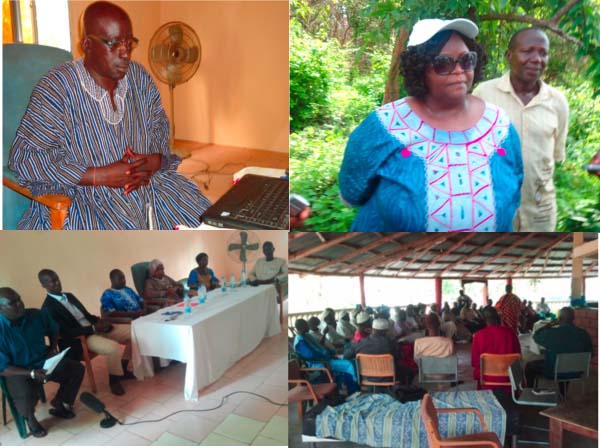
FFF interventions are in no small measure transforming the livelihood of the farming communities.
The following are some of FFF’s achievements, outputs, outcomes, and some of the interventions in 2014 in the regions.
The national coordinator of FFF, Kanimang Camara, gives a brief background on the FFF project, the rationale behind it and what it aims to achieve.
The FFF is to promote cross-sectoral coordination through the Agriculture and Natural Resources Platform and Working Group, enhance the organization and capacity of local forest and farm communities, their livelihood as well as foster an integrated approach toward forest landscape management.
“FFF is a partnership between Food and Agriculture Organization (FAO) of the United Nations, International Institute for Environment and Development (IIED) and International Union for the Conservation of Nature (IUCN)”.
“The facility funds partnership agreements and small grants with stakeholders, women, community producer organizations and governments in support of interventions geared toward strengthening of small-holder producer organizations for business and policy engagements, catalyzing multi-stakeholder policy platforms and linking local voices and learning to the global arena.”
According to Mr. Camara, since the launching of the facility in The Gambia in March 2013, the country activities had focused on the following outputs and outcomes:
Forest and Farm Producer Organizations (FFPOs) are organized for markets and policy dialogue; capacities of FFPOs strengthened through participatory training sessions; working relationship between FFPOs, government and private sector improved; experience-sharing between FFPOs in country shared; cross-sectoral coordination on sustainable management of forest and farm landscapes improved; understanding of local population on ANR sector-related policies improved; community forests legal ownership transfers to local communities supported and strengthened; and local voices heard and listened to at all levels.
Mr. Camara also stated that among the important activities implemented in 2014, in partnership with the National Farmers Platform of The Gambia (NFPG), National Environment Agency (NEA) and Natural Resources Consulting (NACO) are:
Rolling out the Agriculture and Natural Resources Policy to the regions and districts; national tree planting exercises in the regions; National Farmers Conference 2nd Edition organized; cashew farmers and beekeepers to sort out their governance issues; ANR platform nation- wide treks to assess how ANR policies are implemented at grassroots level; ANR Working Group and Platform feedback meetings; capacity development programmers for FFPOs on bee-keeping, handicrafts, CF steps, construction and use of mud stoves, participation of NFPG president in 2014 COFO in Rome; participation of representative of Policy Analysis Unit in the conference of FFPOs held in China; farmer-to-farmer field visits; and contact and collaboration fairs aiming at linking local FFPOs to business development services.
Also, national awareness-raising meeting on voluntary guidelines on responsible governance of tenure; support to community forest legal ownership transfers; periodic radio and TV programmes on ANR issues; and initiation of FFF small-grants scheme to provide support directly to FFPOs with bankable project proposals.
In the country, FFF activities are being facilitated by the National FFF facilitator, with support from the FAO country office.

